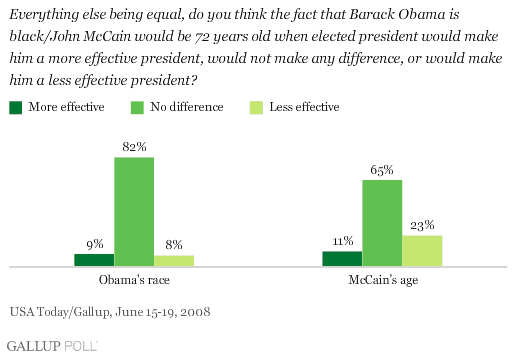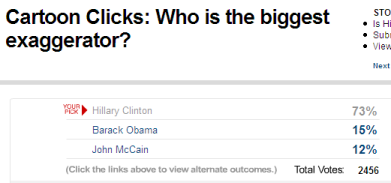July 10th, 2008 by Rightsideup
(back from vacation so likely to be posting slightly more frequently again)
CNN has a story about a Gallup poll relating to John McCain’s age and Barack Obama’s race, and it draws some strong conclusions from the poll. But it seems to me that the poll is asking the wrong questions:

The question should be, “does John McCain’s age / Barack Obama’s race make you any less likely to vote for him?” The numbers of people who say these facts are a problem in both cases are pretty tiny anyway, but nowhere in this question are voters asked to rank these concerns against other factors that may influence the way they vote. All 11% of those saying McCain’s age is a problem may think that other factors outweigh it (or may be Democratic voters who wouldn’t vote for him in the first place), while many of the 9% who think Obama’s race is a problem are probably systemic racists who would be unlikely to vote for a black man for president regardless of other factors. Don’t we need more information here to draw the kind of conclusion CNN does?
Posted in age, barack obama, john mccain, polls, race | Comments Off on Polls asking the wrong question
June 25th, 2008 by Rightsideup
I was pleasantly surprised by this article in the Guardian reporting on the horror of the global warming community to find that even the Brits are not convinced by the alarmism they’ve been spreading. The UK has always seemed to me (based on my frequent trips back and conversations with people there) to be much further along in its adherence to the global warming “consensus” and so this surprised me along with the warming lobby. From the article:
The majority of the British public is still not convinced that climate change is caused by humans – and many others believe scientists are exaggerating the problem, according to an exclusive poll for The Observer.
The results have shocked campaigners who hoped that doubts would have been silenced by a report last year by more than 2,500 scientists for the UN Intergovernmental Panel on Climate Change (IPCC), which found a 90 per cent chance that humans were the main cause of climate change and warned that drastic action was needed to cut greenhouse gas emissions.
I’m tempted to say that the British public is smarter than I thought: they don’t just buy this stuff hook, line and sinker as the media has attempted to suggest. Even 2500 scientists can’t persuade them! In reality of course, many ordinary people simply go by the headlines rather than the detailed analysis – what percentage of those surveyed could have told you how many scientists – to the nearest thousand – had authored/agreed that report? (They’d probably have a better answer for how many climate change scientists it takes to change a lightbulb.)
But in most cases most ordinary people who don’t spend their lives with noses buried in newspapers have to go on personal experience plus the occasional headline, tempered by an inherent distrust of the media. In this case, that’s won out over all the blathering by politicians on this subject and the massive buy-in from the media. Pretty impressive that that’s still possible in an age when most of the electorate seems disengaged from the political process in the UK. Now if only that would start translating to political policies…
Posted in climate change, polls, uk | Comments Off on Even in the UK they’re global warming sceptics
May 28th, 2008 by Rightsideup
CNN (along with other major news outlets) has been trying to talk the US into a recession now for several years, and while the jury is still out on whether they’ve succeeded yet, they still aren’t letting up. Although this article has some admirable counter-points thrown in, it still relies mainly on anecdotal perceptions rather than the facts to examine the state of the economy.
The article also highlights one of the things which, as a Brit, I find most puzzling about American politics and economics – the definition of the “Middle Class” – which appears sometimes to include everyone except Bill Gates and Warren Buffett and at other times now includes apparently almost no-one because it is being “squeezed”. Where I come from, being Middle Class is about the kind of work you do – sitting in an office rather than working in a factory, for example – not about your level of income or what you can afford to buy with it.
At any rate, quoting from that article:
Only a few years ago, Americans who considered themselves middle class were scrimping to pay for their kids’ college education.
Now, many of them are struggling to cover far more basic needs – gas and groceries.
Take Stacy and Chuck Burris. The Pittsburgh, Pa., couple view themselves as solidly middle class. In recent months, however, they’ve felt anything but.
Burdened by high cost of food and fuel, they are having trouble balancing their budget even though Chuck Burris earns a “comfortable salary” as a software engineer. The parents of five children, three of whom are grown, have essentially stopped eating out and entertaining and are considering canceling the annual family vacation to Maine. They keep to a Spartan shopping list and have planted a larger garden. Instead of buying their 12-year-old daughter summer clothes, they are turning her pants into shorts by cutting off the legs and getting hand-me-downs from family.
Never before in previous recessions have they had to cut back like this.
Without wishing to belittle this or other families’ hardships, I find it hard to understand how current circumstances could be having such a significant impact on their financial status. The article says that:
Food prices, for instance, climbed 5.1% over the past 12 months and April’s 0.9% rise was the largest in 18 years, according to the Consumer Price Index. Gas, meanwhile, hit its highest recorded price of $3.937 on Monday, up nearly 21% from a year ago and 9.7% over the past month, according to AAA.
Well, assume the weekly grocery bill is $200 – not unreasonable, I would think – and the price has gone up by 5% – that would be a sum total of $10 per week extra, or $45 per month. If gas has gone up by 20%, perhaps the gas bill (assuming filling a 15-gallon tank once a week) has gone up by 20%, from $50 to $60, and that’s another $10 per week or $45 per month. Is there really a middle-class family that’s going to be pushed into cancelling its vacation by a $20 increase in spending per week? We’re never told what the household’s income actually is, but assume it’s $60,000 per year gross (which may be conservative since the salary is described as “comfortable”). That increase represents just 1.7% of gross income.
At the same time, the article says, housing prices are falling, but unless you’re actually trying to sell your house that shouldn’t really affect your current financial status. In fact, because the federal funds rate has fallen from 5.25% to around 2% in the last year many people’s mortgage payments should actually be falling during this time, probably by a rather greater amount than those small increases in food and gas payments.
My point here isn’t to argue the specifics of this case – because we’re not given them – but rather to suggest that it seems odd that truly middle class families should be suffering so badly because of the increases in gas and food prices, since these items are typically a small percentage of people’s incomes, especially in the middle class. And that makes this article feel more like further scaremongering from CNN than real reporting. How about emphasizing instead the factual evidence cited elsewhere in the article, and helping to turn around these perceptions, instead of leading with the perceptions and burying the facts halfway down the article and later? And how much are those poll results influenced by the fact that CNN’s been polling people about whether we’re in a recession for the last three years anyway?
Posted in cnn, economics, food prices, polls, recession | 1 Comment
March 31st, 2008 by Rightsideup
Just saw a poll on the CNN site. Looks like the Bosnia thing (and one or two others) have really hurt Hillary’s reputation for trustworthiness:

What’s more surprising is that Obama and McCain are even in this, even though Barack has undoubtedly been much worse in trying to pad his resume and make his achievements sound more grandiose than McCain has. Arguably, McCain has the opposite problem – over-honesty about his weakness in financial matters, for example. But I guess that can be put down to partisanship as much as anything else. Obviously this isn’t scientific – it’s just an online poll with self-selection and no attempt to make the result representative, but it’s telling nonetheless.
Posted in 2008, barack obama, hillary clinton, honesty, john mccain, polls | Comments Off on Hillary the biggest exaggerator
March 26th, 2008 by Rightsideup
According to a new Gallup poll, just over a quarter (28%) of Clinton supporters say they will vote for McCain rather than Obama if she doesn’t win. By contrast, just 19% of Obama supporters say they will support McCain. As with any poll, especially one taken so far ahead of the event it relates to, this must be taken with a large dose of salt, but it’s educational nonetheless.
Allahpundit over on Hot Air suggests that this is a measure of “sore-loserness” but I think that misses the point. The point is that there are at least two reasons why someone willing to vote for Clinton would be more likely to switch to McCain than someone who wanted Obama. The first is that, for those few people who can accurately place all three candidates on a traditional left-right spectrum, Hillary is closer to McCain than the comparably more left-wing Obama.
The second, though, and one more likely to be at play here, is that those favoring a serious candidate will prefer both Clinton and McCain over the less substantive Obama. While Clinton has of late taken to embellishing her own credentials she has overall focused far more on specifics and has a greater record on which to draw than does Obama. It’s likely that voters favoring experience and substance shy away from Obama and prefer Clinton to McCain by a greater or lesser margin.
Allahpundit goes on from his initial premise that this is about Hillary supporters being sorer losers to suggest that they key to keeping these numbers high is to make those supporters as sore as possible. But I think the correct strategy would actually be to continue to highlight Obama’s lack of substance, which is behind at least some Democrats’ distrust of him.
Posted in 2008, barack obama, elections, hillary clinton, john mccain, polls | Comments Off on A quarter of Clinton supporters favor McCain over Obama



